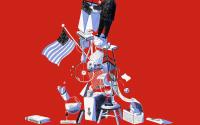Jane WalkerAugust 27, 2002
Spain's decision yesterday to outlaw Batasuna, the political wing of the Basque separatist movement Eta, is the culmination of a 25-year battle to limit the operations of the party. But the ban will resolve nothing; indeed, in the short term it may provoke violence within the Basque country and lead to an increase in support for the banned party.
The politicians who voted for the ban were clear about the symbolism of their action. "When Eta kills and Batasuna applauds, you can't just talk about principles," Luis de Grandes, spokesman of the ruling Popular party, said. "You have to stand side by side with the victims." Whether it will produce practical benefits is, however, a moot point.
Though more than 90% of the Spanish parliament, convened in emergency session, voted for the measure, it must be approved by the supreme court before it can come into effect. The steps are expected to take four months, but the other parties hope Batasuna will be outlawed by the end of 2002 to prevent it standing in municipal elections in 2003. It is in regional politics that the party holds most power: it controls 62 town councils, and seven seats in the Basque parliament.
The Basque people of north-eastern Spain, who number 3 million, believe themselves different from other Spaniards and make great play of the separateness of their identity. "Blood-typing and other genetic studies show the Basques to be a people distinct from any other in Europe, rooted in the Pyrenees and Cantabrian mountains before Indo-European tribes arrived," says one Basque website. "As a saying goes, before God was God and boulders were boulders, Basques were already Basques."
The Basques have their own language and culture and even had an independent state at the beginning of the Spanish civil war. Under a statute of autonomy they enjoy a wide measure of self-government, with their own parliament and responsibility for health, education, transport, trade and development. There is a percentage of the Basque people - not much more than 10% - for whom this is not enough. They want independence. This is what Batasuna and Eta are fighting for, and the battle has cost more than 700 lives over 30 years. They have little, if any, support in the rest of the country, and opinion polls show that terrorism is a key concern of Spaniards, well ahead of illegal immigration.
Batasuna has never been the largest party in the Basque country, but has always been able to rely on a hard core of supporters prepared to demonstrate noisily, and often violently, in its favour. Since standing in 1979, when it won 146,195 votes, its support has remained at around 150,000, although it did better than that in 1998 and 1999. The dip in the election for the Basque parliament in 2001, when the vote fell back to 1979 levels, suggested Basques had grown tired of the bloodshed.
Ever since its foundation, the party has been involved in clashes with the national government. In 1980, attempts were made to ban the party because its statutes did not support the constitution. But a Madrid court rejected the bid, marking the start of a six-year battle. The supreme court eventually ruled in Batasuna's favour.
The party was founded in 1978 as a coalition of radical nationalist parties to stand in the first democratic elections in 1979. Its name, Herri Batasuna (People United), was changed to Euskal Herritarrok (Basque Citizens) in 1998, and then reverted to Batasuna last year.
Batasuna has been closely allied to Eta, and many known terrorists began their career in Batasuna or its youth wing, Jarrai, by taking part in the nightly kale borroka , street violence, when gangs rampage through Basque towns and villages. Batasuna meetings and publications make heroes of Eta terrorists, as well as praising hooligans. At no time has the party condemned any Eta attack. Batasuna leaders blamed the August 10 bomb in the Costa Blanca resort of Santa Pola, in which two died, on the government for ignoring Basque demands.
There are fears that the ban could spark violent reactions, not only in the Basque country but in the rest of Spain. There was anger when Basque bishops issued a pastoral letter expressing concern about dire consequences if Batasuna was outlawed. A few days later Juan Jose Ibarretxe, the Basque president, warned that banning Batasuna would be oxygen for Eta and would push peace even further away.
At pro-Batasuna demonstrations over the weekend in Bilbao and San Sebastian the party issued warnings for the future of the Basque country, described as being in a "state of emergency". "Don't let them think that they can use the mechanisms at their disposal to beat Batasuna and collaborate with the genocide of the Spanish state," said one speaker.
Few in Spain will openly draw any parallel between the Basque country and Northern Ireland, and the government refuses to consider contact with Eta until it renounces violence. Tentative talks in the 80s and 90s failed to end the stalemate. But many now accept that government representatives will have to sit down with Eta to discuss bridging the rift.
Jane Walker is a journalist based in Madrid






